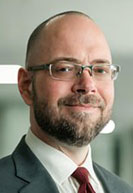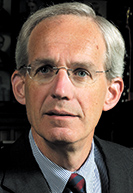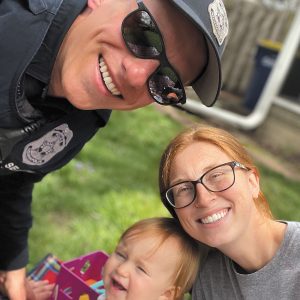Subscriber Benefit
As a subscriber you can listen to articles at work, in the car, or while you work out. Subscribe NowIt took Casey Seaton a year of working at a law firm doing civil work to decide it wasn’t his passion.
“I just kind of came to terms with myself that just working in the office all day long and in this capacity, kind of disconnected from the work or having passion to the work really wasn’t going to cut it in the long run,” Seaton said. “I looked into other routes, other things ended up getting into community development.”
He found his way to the Indianapolis Metropolitan Police Department, where he served as an officer and now teaches law at the IMPD training academy.
Seaton’s book “Between Mayberry and the Military” was published last month after four years in the making.
It details his time as a IMPD police officer.
When Seaton, a 2016 Indiana University Robert H. McKinney School of Law graduate, left law, he first worked as the program and event coordinator with Midtown Indy.
In that role, he got to work with IMPD representatives at community outreach meetings.
Michael McKillip, Director of Infrastructure at the United Way of Central Indiana, worked with Seaton at Midtown Indy.
He said when he met Seaton, he struck him as a bright person looking to make a deep impact on his community.
“He’s the kind of person who’s never met a stranger and genuinely cares about every human being he’s come into contact with,” McKillip said. “He was natural at developing relationships, which is key to building trust and community.”

Seaton left Midtown Indy after being accepted into the academy.
“I kind of realized a lot of what they were doing was community development from just a different angle, or community wellness in a sense,” Seaton said.
He said he saw a need and took the plunge into the police world and hasn’t looked back since.
Becoming a police officer
Seaton entered the academy at a time, when optimism was high at IMPD.
Incoming officers were receiving a big pay increase and the department had the highest number of women recruits ever.
But then things quickly changed.
First, Officer Breann Leath died in the line of duty while responding to a domestic violence call. Then, the COVID-19 global pandemic started.
Next, George Floyd was murdered by a Minneapolis police officer, sparking riots and protests across the nation.
Seaton gave a speech at his graduation from the academy.
In his speech, Seaton mentioned these events and noted that he and other graduates faced some of the most impactful civil unrest of their lives while in the academy.

Frank Sullivan, an Indiana University Robert H. McKinney School of Law professor and former Indiana Supreme Court justice, was the chairman of the Indianapolis Civilian Police Merit Board from 2019 to 2023.
The board approves the hiring of all recruits and attends the swearing-in and graduation ceremonies. That’s how Sullivan met Seaton.
“We really don’t hear very often from patrol officers in the course of that dialogue. We hear from the brass in the department, and we hear from people in the community who feel aggrieved. But the patrol officer just never seems to hear his or her side of the story,” Sullivan said. “And here, he just lays it out there and talks about what they encounter day in and day out. – the mistakes that they make, the way in which people sometimes express appreciation but sometimes show abuse. He just tells you the story and lets you draw your own conclusions about what big city policing is like.”
Seaton now teaches the basics of criminal law at the police academy.
He said he went from a non-criminal law focus to solely a criminal law focus to now teaching it.
“(I’m) creating a foundation for officers in Indy, which is pretty cool to have that influence,” Seaton said.
A way to air things out
For Seaton’s book, he said he just started taking notes and writing down what daily life was like as an officer.

Seaton said that it was unintentionally therapeutic for him to write everything out. He said a lot of the police work he did was responding to mental health incidents and how police endure trauma through their work.
There eventually was enough for a book so he started organizing it into chapters. There are chapters that go into his life story and then the violence he faced in the city of Indianapolis.
“It’s all over the place, but in an organized manner,” Seaton said.
Seaton had McKillip review his book before it was published and he said he was nervous at first and questioned how it would come across because Seaton hadn’t been an officer for that long.
“It was riveting, insightful, wise beyond the years, as Casey is always guilty of being,” McKillip said. “I thought it told not just the day in the life of a cop, but how that ties into the world of policing and conflict surrounding us all in the modern day. It very well interlaced who he was as a person, how he policed and where he saw policing going.”
Seaton said he’s enjoyed seeing people with the book.
“The real cool thing is I’ve started seeing other people showing me their copy of it, and then it was like, this is super neat to see other people excited about something I’ve put together,” Seaton said. •
Please enable JavaScript to view this content.

